Search Images
Browse Content (p. 1576)
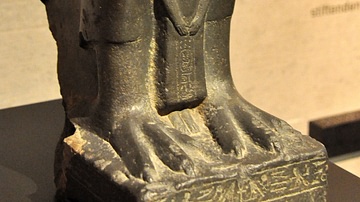
Image
Horus & Nectanebo II
In this greywacke statue, the god Horus (depicted as a falcon; head is lost) protects the praying figure of Nectanebo II. From Memphis, Egypt. 30th Dynasty, circa 350 BCE. (State Museum of Egyptian Art, Munich, Germany).
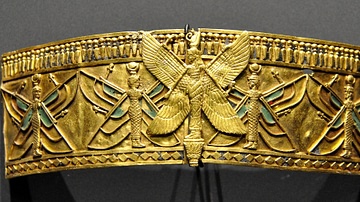
Image
Nubian Armlet
Gold armlet with a figure of a winged goddess. From the treasure of the Nubian queen Amanishakheto, pyramid N6, Meroe, modern-day northern Sudan. Meroitic period, around 1 CE. (State Museum of Egyptian Art, Munich, Germany).
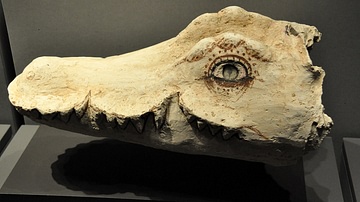
Image
Crocodile Mummy Mask
Mummy mask for a crocodile with traces of mummy wrapping inside. Stucco, linen, and glass. From modern-day Egypt. Roman period, 1st and 2nd centuries CE. (State Museum of Egyptian Art, Munich, Germany).
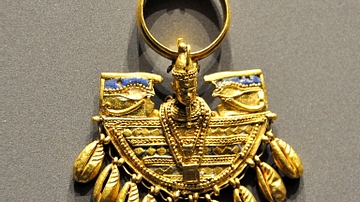
Image
God Sebiumeker Gold Shield
Gold shield with the head of god Sebiumeker. From the treasure of the Nubian queen Amanishakheto, pyramid N6, Meroe, modern-day northern Sudan. Meroitic period, around 1 CE. (State Museum of Egyptian Art, Munich, Germany).
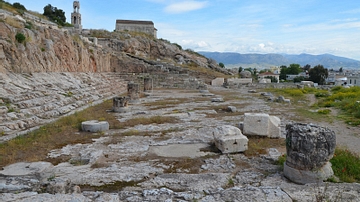
Image
The Telesterion, Eleusis
The Telesterion was a large rectangular hall, probably columned, in the Sanctuary of Demeter and Kore at Eleusis (Greece). It served as the initiation Hall and Temple for the Eleusinian Mysteries. Date of construction: c. 435 BCE - 421 BCE
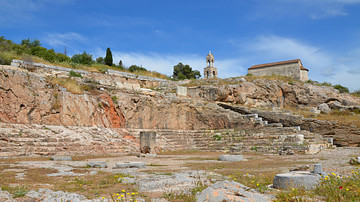
Image
Telesterion, Sanctuary of Demeter & Kore, Eleusis
The Telesterion was a large rectangular hall, probably columned, in the Sanctuary of Demeter and Kore at Eleusis (Greece). It served as the initiation Hall and Temple for the Eleusinian Mysteries. Date of construction: c. 435 BCE - 421 BCE
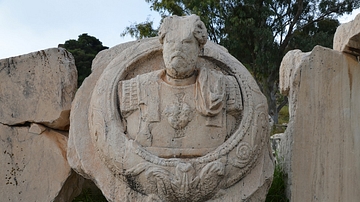
Image
Cuirassed Bust of a Roman Emperor from Eleusis
This cuirassed bust of an emperor was installed at the centre of the pediment of the Greater Propylaea at Eleusis (Greece). Although the face is badly damaged, it may be a portrait of the emperor Marcus Aurelius who built the Greater Propylaea...
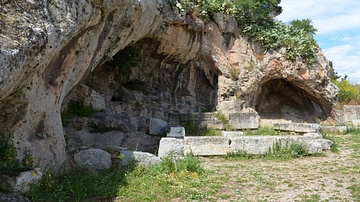
Image
Sanctuary of Pluto at Eleusis
The Sanctuary of Pluto/Hades was a peribolos wall enclosing a cave through which Pluto brought Kore back from the underworld. The small temple was built c. 328 BCE but was remodeled on many occasions from the 4th century BCE down to Roman...
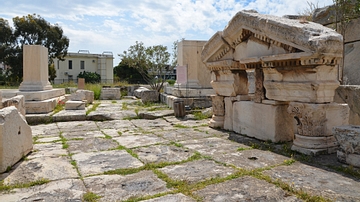
Image
Triumphal Arch, Eleusis
The ruins of the East Triumphal Arch built by Antoninus Pius in the 2nd century CE outside the Sanctuary of Demeter and Kore at Eleusis.

Image
Greater Propylaea or Gateway, Eleusis
The Greater Propylaea at the Sanctuary of Eleusis (Greece) was a monumental gate probably built by Marcus Aurelius on the same site as an earlier gate from the time of Kimon, c. 170 CE - c. 180 CE.